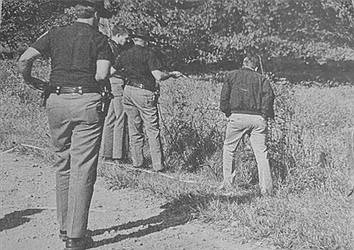Health Dept. to continue lead testing
April 26, 2022 at 8:45 p.m.
Thanks to the state of Indiana's Health Issues and Challenges Grant, the Franklin County Health Department will soon begin doing capillary lead testing for children. So announced county nurse Deb Tibbetts at the quarterly health board meeting April 19.
This could lead to the more advanced and accurate venous testing if a capillary test comes back showing a high level of lead in the blood.
Tibbetts has also been doing inspections around the county and teaching her team members about the process.
“The state has lowered the lead level, so anything over 3.5 (micrograms per deciliter, down from the former elevated minimum of 5) we do an investigation,” said the nurse. “I'll get with the state and then use (sanitarian Curt Cox) to go out to the home and check lead levels.
“I would encourage them to get a lead level drawn where they're at an appropriate age and if elevated, we could have Curt come out.”
Cox will attend a lead risk assessor course in Cincinnati in August en route to becoming licensed. “I've been reading and learning all I can about lead testing,” he said.
This month, Tibbetts is also attending National Child Passenger Safety (CPS) Certification training. Related, the department will receive a grant to provide car seats for families unable to afford them. The first allotment is 50, then need-based after that. The grant will be reviewed in July.
Dr. David Welsh, public health officer, added the program has been very beneficial in Ripley County.
In Welsh's report, he said it was great to “be with this group sans masks,” later adding he thinks problems with masks and vaccines are in the rear view.
He noted this time of year, when foliage is not up completely, it is a good time to check any properties that collect water to avoid mosquito trouble in the summer. Other reminders included adults making sure their tetanus boosters are up to date, and planning things for the summer that will help individuals and the community.
Welsh advised people to make use of the “beautiful” trails in the county and said this was especially a good year to consider putting out a garden, however small, as grocery prices soar. With cookout season coming up, he wants to convey the importance of food safety – “make sure hot food is hot and cold food is cold.”
Another recommendation was for families to have their own emergency management place prepared. “Where do you go if there's rain or a tornado?” he said, “have medications and basic things like contact information, maybe some safety cash if electricity goes out and you can't access an ATM.”
With the team, he's moving forward with firearm safety information. “People in the area are so strong about making sure they protect themselves and the Second Amendment … we need to make sure they're doing it safely,” he said.
Welsh also serves on the governor's public health commission, which met recently to compile recommendations to state legislators on areas such as rural health and workforce issues. He has new information for Cox and fellow sanitarian David Fehlinger on remediation of damaged septic systems and said his shadowing of Fehlinger on formal food inspections was “very interesting.”
“I'm happy with what you're doing, trying to get the horse back on the path, so to speak,” said board president Joe Meier.
Cox predicted fewer septic systems due to the economy slowing down development in the county. Recently, he conducted two sessions of septic training for local installers at Franklin County Public Library; he estimated about 16 companies at each session. There was open-book testing and certification. Anyone who needs to take the test can set up time in the health office.
Tibbetts called Nanette Beres a great addition to the nursing staff. She stated she's been listening and learning and reaching out to community organizations like Stayin' Alive and the Franklin County 4-H Fair Board. She's become a Basic Life Support instructor since joining the department and has done health screenings and cybersecurity sit-ins.
The new secretary-registrar is Lisa Meier, replacing the retired Mary Burk. The transition included learning about vital records, office purchasing, vaccine scheduling, getting charts ready for nurses, budgets, submitting payroll and storage handling.
Michael Falk was hired as the new local health coordinator. He grew up in New Jersey, has been a military medic and spent 13 years running an infantry battalion medic section.
Tibbetts reported on several items. She attended a virtual course conducted by the Global TB Institute, calling it “exceptional.” The Covid supplemental grant was renewed and extended from July 1 to June 30, 2023; this is contingent on extended hours – one evening hour a week and one weekend a month – to provide for people who can't get to the office during regular hours. A contact at the state recommended applying to the Indiana Environmental Health Association. FC Sheriff Peter Cates notified Tibbetts his department was running low on Narcan; she put him in touch with the state about a first responders' grant. She said there are Narcan doses at the health department and library for emergency use.
A Co-Ag School Grant for $110,000 was also received to complete routine student screenings missed during the pandemic.
Grant coordinator Connie Kuehn said Dr. Welsh has signed off on a pair of grants and an extension for additional appropriations with the auditor's office. Funds will be used to purchase new medical refrigerators for vaccine storage, as well as septic equipment, automated external defibrillators, eye wash and accompanying plumbing, a HIPAA-certified shredder, printer supplies and computer software.
Latest News
E-Editions
Events
Thanks to the state of Indiana's Health Issues and Challenges Grant, the Franklin County Health Department will soon begin doing capillary lead testing for children. So announced county nurse Deb Tibbetts at the quarterly health board meeting April 19.
This could lead to the more advanced and accurate venous testing if a capillary test comes back showing a high level of lead in the blood.
Tibbetts has also been doing inspections around the county and teaching her team members about the process.
“The state has lowered the lead level, so anything over 3.5 (micrograms per deciliter, down from the former elevated minimum of 5) we do an investigation,” said the nurse. “I'll get with the state and then use (sanitarian Curt Cox) to go out to the home and check lead levels.
“I would encourage them to get a lead level drawn where they're at an appropriate age and if elevated, we could have Curt come out.”
Cox will attend a lead risk assessor course in Cincinnati in August en route to becoming licensed. “I've been reading and learning all I can about lead testing,” he said.
This month, Tibbetts is also attending National Child Passenger Safety (CPS) Certification training. Related, the department will receive a grant to provide car seats for families unable to afford them. The first allotment is 50, then need-based after that. The grant will be reviewed in July.
Dr. David Welsh, public health officer, added the program has been very beneficial in Ripley County.
In Welsh's report, he said it was great to “be with this group sans masks,” later adding he thinks problems with masks and vaccines are in the rear view.
He noted this time of year, when foliage is not up completely, it is a good time to check any properties that collect water to avoid mosquito trouble in the summer. Other reminders included adults making sure their tetanus boosters are up to date, and planning things for the summer that will help individuals and the community.
Welsh advised people to make use of the “beautiful” trails in the county and said this was especially a good year to consider putting out a garden, however small, as grocery prices soar. With cookout season coming up, he wants to convey the importance of food safety – “make sure hot food is hot and cold food is cold.”
Another recommendation was for families to have their own emergency management place prepared. “Where do you go if there's rain or a tornado?” he said, “have medications and basic things like contact information, maybe some safety cash if electricity goes out and you can't access an ATM.”
With the team, he's moving forward with firearm safety information. “People in the area are so strong about making sure they protect themselves and the Second Amendment … we need to make sure they're doing it safely,” he said.
Welsh also serves on the governor's public health commission, which met recently to compile recommendations to state legislators on areas such as rural health and workforce issues. He has new information for Cox and fellow sanitarian David Fehlinger on remediation of damaged septic systems and said his shadowing of Fehlinger on formal food inspections was “very interesting.”
“I'm happy with what you're doing, trying to get the horse back on the path, so to speak,” said board president Joe Meier.
Cox predicted fewer septic systems due to the economy slowing down development in the county. Recently, he conducted two sessions of septic training for local installers at Franklin County Public Library; he estimated about 16 companies at each session. There was open-book testing and certification. Anyone who needs to take the test can set up time in the health office.
Tibbetts called Nanette Beres a great addition to the nursing staff. She stated she's been listening and learning and reaching out to community organizations like Stayin' Alive and the Franklin County 4-H Fair Board. She's become a Basic Life Support instructor since joining the department and has done health screenings and cybersecurity sit-ins.
The new secretary-registrar is Lisa Meier, replacing the retired Mary Burk. The transition included learning about vital records, office purchasing, vaccine scheduling, getting charts ready for nurses, budgets, submitting payroll and storage handling.
Michael Falk was hired as the new local health coordinator. He grew up in New Jersey, has been a military medic and spent 13 years running an infantry battalion medic section.
Tibbetts reported on several items. She attended a virtual course conducted by the Global TB Institute, calling it “exceptional.” The Covid supplemental grant was renewed and extended from July 1 to June 30, 2023; this is contingent on extended hours – one evening hour a week and one weekend a month – to provide for people who can't get to the office during regular hours. A contact at the state recommended applying to the Indiana Environmental Health Association. FC Sheriff Peter Cates notified Tibbetts his department was running low on Narcan; she put him in touch with the state about a first responders' grant. She said there are Narcan doses at the health department and library for emergency use.
A Co-Ag School Grant for $110,000 was also received to complete routine student screenings missed during the pandemic.
Grant coordinator Connie Kuehn said Dr. Welsh has signed off on a pair of grants and an extension for additional appropriations with the auditor's office. Funds will be used to purchase new medical refrigerators for vaccine storage, as well as septic equipment, automated external defibrillators, eye wash and accompanying plumbing, a HIPAA-certified shredder, printer supplies and computer software.





